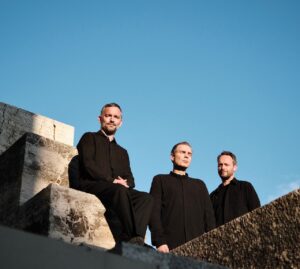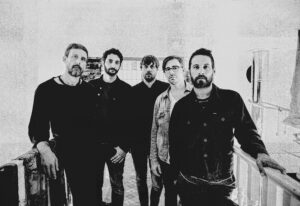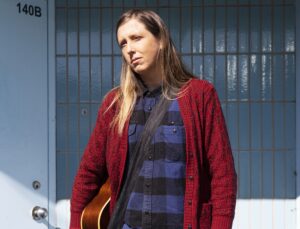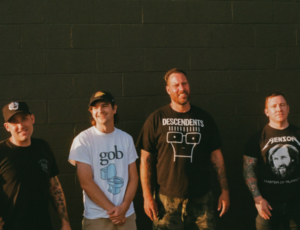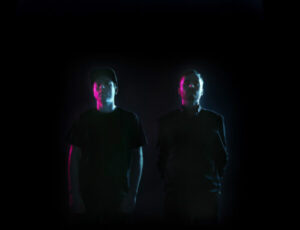Two weeks ago, I would have told you I was going to this show exclusively to see Martha Wainwright. But that was before AroarA (pronounced “aurora”), a new Montreal-based duo comprised of core Broken Social Scene member and Apostle of Hustle-founder Andrew Whiteman and his wife Ariel Engle, were announced as the openers.
Ideally, it’s cool to be able to personally witness veteran musicians get their live bearings with new projects, when they’re at their freshest and most invigorating. And I’ve been a huge Andrew Whiteman fan since BSS became one of the most preeminent torch-carriers of early-2000s indie rock, so this night was extra exciting for me.
Unfortunately, however, I can’t stand drum machines live, and AroarA’s entire set was based around a sampler. Its rigid, synthetic pre-recorded sounds felt jarringly incongruent against the duo’s organic, potentially spontaneous musicianship. But when that clashing dynamic wasn’t too distracting, Engle and Whitemen were both impressive, their harmonies fluid, guitar-work intricate enough and arrangements unconventional and interesting despite sometimes lacking direction even when quite closely pinned to the drum machine’s linear thumps.
Having been accustomed to solo acoustic shows at the Rio, such as pianist/rapper/general mad genius Chilly Gonzales and core Mountain Goat John Darnielle, I expected Martha Wainwright to continue the trend. I was curious – knowing she intentionally employed dark electronics to give Come Home To Mama an “apocalyptic” edge in order to avoid the alt-folk tag that she felt did not fit her new songs – how her new “non-folk” offerings would have translated in a solo acoustic setting.
Well, I’m still wondering. AroarA returned as half of Martha’s back-up band, with Ariel providing most of the harmonies and Whiteman playing lead guitar, and Martha’s husband Brad Albetta on bass. While not the stripped down folk interpretations I expected from a solo acoustic show, the new songs were not the dark non-folk for which she strove either; there were no electronics except sparingly on, if I remember correctly, “Bleeding All Over You”, when the sampler did seem appropriate. But Whiteman breathed a different life into the songs, a more exotic and upbeat one, throwing in lively tremolos and arpeggios where they didn’t appear on record. Whiteman filled the gaps left by absent brass and synths so skilfully that he really did seem like the perfect choice for the task.
Martha herself was playful and lively all night, if a bit tipsy. After her first few songs, which included older tunes “This Life” and “Factory”, she called the concession girl up towards the stage to take a peek at what she had to offer. “Let’s get into the spirit; it’s Saturday night!” Martha rooted as she accepted a PBR on the house.
No doubt the drink loosened Martha up, but songs like “I Wanna Make an Arrest” and “Radio Star” made me see how much of a rock star she could be. She never bounced all over the stage, but she certainly didn’t stand still either, swaying to and fro, hiking up her legs, kneeing the air so her vibrant leg warmers were clear for everyone to see.
Anyone who’s familiar with Martha Wainwright knows that her greatest asset is not her stage-antics or banter but her voice. It’s so rich and immense that it could fill a far larger venue like the Orpheum or Queen Elizabeth Theatre with ease. But whereas those venues would give you a sense of how large her voice is by way of her voice seeping into every crevice, a smaller venue such as the Rio emphasized the size of her voice through intimacy.
It was in solo moments, when the audience had nothing else to focus on but Martha, that her voice shone the brightest – despite some setbacks. The centrepiece of both Come Home To Mama and her current tour is without a doubt “Proserpina”, the most sorrowful song in her repertoire. As the final song written by her late mother Kate McGarrigle just two months before she passed away, Martha always sings “Proserpina” in tribute. Though the delicate harmonies and feverish, swarm-like strings that make Martha’s version so moving were absent, the raw power and emotion of it still should have put the audience into a reverent awe. But Brad’s piano was totally de-tuned, nearly ruining the performance. Fortunately, Martha’s voice is so amazing that it alone was able to salvage the number. The rickety piano at least sounded better and even fitting as old-timey “piani” on Martha’s only encore, the pop standard “Stormy Weather”.
Despite the sour notes on “Proserpina”, certainly my most anticipated song of the night, the rest of Martha’s performance could not have been better. But more important than making me happy, I think we all knew – Martha most of all – that she would have made her mother happy, could Kate have been there to see it.
